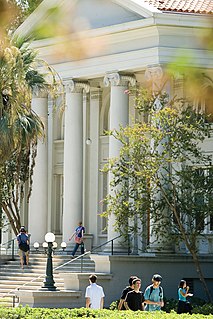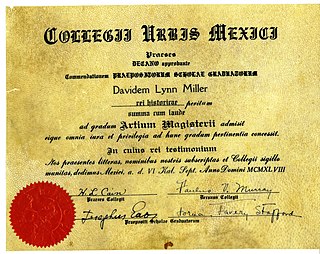A bachelor's degree or baccalaureate is an undergraduate academic degree awarded by colleges and universities upon completion of a course of study lasting three to six years. The two most common bachelor's degrees are the Bachelor of Arts (BA) and the Bachelor of Science. In some institutions and educational systems, certain bachelor's degrees can only be taken as graduate or postgraduate educations after a first degree has been completed, although more commonly the successful completion of a bachelor's degree is a prerequisite for further courses such as a master's or a doctorate.

Undergraduate education is education conducted after secondary education and before postgraduate education. It typically includes all postsecondary programs up to the level of a bachelor's degree. For example, in the United States, an entry-level university student is known as an undergraduate, while students of higher degrees are known as graduate students. Upon completion of a number of required and elective courses as part of an undergraduate program, the student would earn the corresponding degree. In some other educational systems, undergraduate education is postsecondary education up to the level of a master's degree; this is the case for some science courses in Britain and some medicine courses in Europe.
An associate degree is an undergraduate degree awarded after a course of post-secondary study lasting two to three years. It is a level of qualification above a high school diploma, GED, or matriculation, and below a bachelor's degree.

A Master of Science is a master's degree in the field of science awarded by universities in many countries or a person holding such a degree. In contrast to the Master of Arts degree, the Master of Science degree is typically granted for studies in sciences, engineering and medicine and is usually for programs that are more focused on scientific and mathematical subjects; however, different universities have different conventions and may also offer the degree for fields typically considered within the humanities and social sciences. While it ultimately depends upon the specific program, earning a Master of Science degree typically includes writing a thesis.
The Bachelor of Applied Science, often abbreviated as B.AS., BAS, BSAS, BASc, B.A.Sc., or BAppSc, is an undergraduate degree. There are also Bachelor of Arts and Science and Bachelor of Administration Science undergraduate degrees, also abbreviated to BASc.
Regulation and licensure in engineering is established by various jurisdictions of the world to encourage life, public welfare, safety, well-being, then environment and other interests of the general public and to define the licensure process through which an engineer becomes licensed to practice engineering and to provide engineering professional services and engineered product to the public.

A diploma is a document awarded by an educational institution testifying the recipient has graduated by successfully completing their courses of studies. Historically, it has also referred to a charter or official document of diplomacy.

Conestoga College Institute of Technology and Advanced Learning is a public college located in Kitchener, Ontario, Canada. Established in 1967, Conestoga serves approximately 23,000 registered students through campuses and training centres in Kitchener, Waterloo, Cambridge, Guelph, Stratford, Ingersoll and Brantford with an enrolment of 11,000 full-time students, 30,000 part-time students, and 3,300 apprenticeship students.

An engineering technologist is a professional trained in certain aspects of development and implementation of a respective area of technology. Engineering technology education is even more applied and less theoretical than engineering education, though in a broad sense both have a focus on practical application. Engineering technologists often assist engineers but after years of experience, they can also become engineers. Like engineers, areas where engineering technologists can work include product design, fabrication and testing. Also as with engineers, engineering technologists sometimes rise to senior management positions in industry or become entrepreneurs.
A Bachelor of Engineering or a Bachelor of Science in Engineering is an academic undergraduate degree awarded to a student after three to five years of studying engineering at an accredited college or university.
The ABET, incorporated as the Accreditation Board for Engineering and Technology, Inc., is a non-governmental organization that accredits post-secondary education programs in applied and natural science, computing, engineering and engineering technology.
Engineering management is the application of the practice of management to the practice of engineering. Engineering management is a career that brings together the technological problem-solving ability of engineering and the organizational, administrative, legal and planning abilities of management in order to oversee the operational performance of complex engineering driven enterprises. A Master of Engineering Management (MEM) is sometimes compared to a Master of Business Administration (MBA) for professionals seeking a graduate degree as a qualifying credential for a career in engineering management.
A postgraduate diploma is a postgraduate qualification awarded after a university degree, which supplements the original degree and awards them with a graduate diploma. Countries that award postgraduate diplomas include but are not limited to Bangladesh, Barbados, Belgium, Brazil, Canada, Chile, Colombia, Germany, Hong Kong, Jamaica, Spain, Kenya, South Africa, Sudan, India, Ireland, the Netherlands, New Zealand, Nigeria, Republic of Panama the Philippines, Portugal, Russia, Pakistan, Poland, Saudi Arabia, Singapore, Sweden, the United Kingdom, Sri Lanka, Trinidad and Tobago and Zimbabwe. Level of education and recognition differ per issuing country.
A licentiate is an academic degree present in many countries, representing different educational levels. It may be similar to master's degree when issued by pontifical universities and other universities in Europe, Latin America, and Syria. The term is also used for a person who holds this degree. The term derives from Latin licentia, "freedom", which is applied in the phrases licentia docendi meaning permission to teach and licentia ad practicandum signifying someone who holds a certificate of competence to practise a profession.
A Master of Engineering is either an academic or professional master's degree in the field of engineering.
An engineer's degree is an advanced academic degree in engineering which is conferred in Europe, some countries of Latin America, North Africa and a few institutions in the United States. The degree may require a thesis but always requires a non-abstract project.
A Diplom is an academic degree in the German-speaking countries Germany, Austria, and Switzerland and a similarly named degree in some other European countries including Albania, Bulgaria, Belarus, Bosnia and Herzegovina, Croatia, Estonia, Finland, Poland, Russia, and Ukraine and only for engineers in France, Greece, Hungary, North Macedonia, Romania, Serbia, Slovenia, and Brazil.
Engineering education is the activity of teaching knowledge and principles to the professional practice of engineering. It includes an initial education, and any advanced education and specializations that follow. Engineering education is typically accompanied by additional postgraduate examinations and supervised training as the requirements for a professional engineering license. The length of education, and training to qualify as a basic professional engineer, is typically 5 years, with 15–20 years for an engineer who takes responsibility for major projects.
The Bologna process for standardisation of European higher education specified an undergraduate degree of at least three years called the "licence" or bachelor's degree, followed by a two-year diploma called the master's degree, then a doctorate, meant to be obtained in at least three years. Because of these indicated schedules, the reform is sometimes (erroneously) referred to as "3-5-8". The system applies to the European Higher Education Area.

The Riyadh College of Technology(RCT) is a technical college in Saudi Arabia. It was established in 1403H/1983 as the first college of technology in the Kingdom. Its first objectives and priorities to graduate the qualified technical cadres scientifically and practically to work in technical areas those contribute directly in building the national economy. During the first six years of implementation of the diploma program, the Technical and Vocational Training Corporation (TVTC) was in need for technical trainers to work in its technical institutes. Therefore, the corporation adopted the idea of applying Bachelor program to rehabilitate the distinguished graduates of the diploma program in technical college to work in the field of training in industrial secondary institutes and technical colleges. In 10/06/1409H, a royal decree was issued (M/194/7) to develop the intermediate technical college in Riyadh and the duration of training period for four years to granting bachelor's degree in the technical engineering and give graduates the same privileges granted to graduates of engineering schools in the Kingdom.





